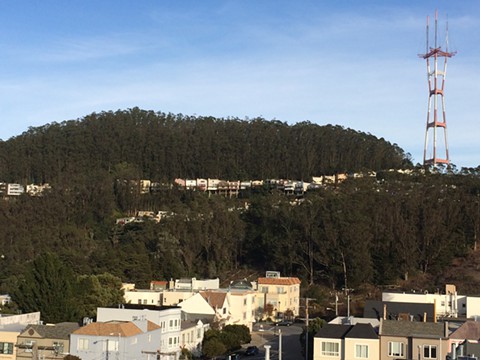Tree War Is Campos vs. Chiu Wild Card
By Joel P. Engardio
A tree war in the little-known San Francisco neighborhoods of Forest Knolls and Miraloma Park – out of sight and mind on the foggy Westside – could get citywide attention in a tight California Assembly race.
Democratic candidates David Campos and David Chiu are both second-term San Francisco supervisors with Harvard Law School degrees who are equally ambitious and savvy as they seek higher office in Sacramento this fall.
They will differentiate themselves in a million shades of blue to court the complex web of interests on San Francisco’s Eastside: gays, Latinos, Chinese, renters, condo owners, starving artists, Twitter millionaires, wealth-redistribution progressives and middle-of-the road Democrats (no Republicans to speak of).
But if they finish even on the Eastside, the votes West of Twin Peaks will become the wild card. Assembly District 17 was redrawn to include parts of the Westside, adding some dynamics Campos and Chiu aren’t used to: a majority of single-family homeowners, fiscal conservatives and a fight over the eucalyptus tree.
The district boundary was moved slightly west to cover Mt. Sutro and Mt. Davidson, where homes are nestled against thousands of non-native trees planted more than a century ago. Residents are divided. Is the tall growth eucalyptus an invasive “tree-size weed” or the deserving occupant of a majestic “cloud forest”?
Many claim the trees are a buffer against otherwise unbearably strong winds. Some fear a fire hazard. Fans enjoy losing themselves in the dense eucalyptus canopy. Detractors complain about a monoculture and lack of open space.
There are plans to thin the non-native eucalyptus trees and replace them with native plants and scrub brush on both Mt. Sutro (controlled by UC San Francisco) and Mt. Davidson (under City Hall’s domain).
A coalition of Westside neighborhood associations is opposed, which might tell Campos and Chiu where the votes are. But like every issue in San Francisco, it’s complicated.
Many liberal environmentalists (Eastside voters Campos and Chiu depend on) are native plant boosters willing to destroy the trees. Meanwhile, a number of conservative Westside homeowners have become The City’s new tree huggers.
Both sides have zealots that pursue native plants or revere the eucalyptus as a religion. In the middle are the Westside voters who approach the tree war as they view most issues -- through a fiscal lens.
They question the wisdom of spending scarce park funds to cut down healthy trees when playgrounds need replacing. They’re also skeptical of the Natural Areas Program, which spends millions trying to bring back plants that have been absent during a century of evolution. If City Hall still can’t get the buses to run on time, they wonder, how can it expect to successfully play the role of Mother Nature?
Both Campus and Chiu said they are still learning about the issue and aren’t ready to take a position. But they may have to go on record if the certification of the Natural Areas Program is appealed to the Board of Supervisors later this year.
Native plant supporters are pushing for a “maximum restoration” version that cuts down more trees to make the most room for reintroducing native vegetation. Tree advocates are hoping for a “maintenance” alternative that limits the scope of the program. Depending on which version is certified, the losing side will likely appeal.
Campos and Chiu could dodge the issue if the appeal is delayed until after their fight for the Assembly seat is over. But Westside voters who live near Mt. Sutro would still want to know if Campos or Chiu would do anything from the state capital when it comes to the trees on UCSF-owned land.
Campos and Chiu might want to attend an upcoming series of three Commonwealth Club lectures on “The Science of Conservation and Biodiversity in the 21st Century.” Professors from UC Berkeley and UC Davis will provide a scientific context for the issues underlying restoration of open spaces.
The April 9 event is specific to eucalyptus trees in the Bay Area. But the series begins Jan. 30 with a discussion on the “mutual adaptation of native and non-native species.”
Biologists call it the “conciliatory approach” and politicians wading into San Francisco’s tree war would be wise to consider it.

